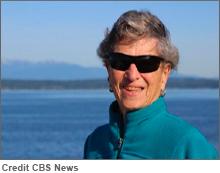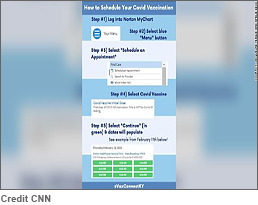EverSafe Newsletter
SENIOR FINANCIAL PROTECTION NEWS
Providing thought-provoking articles, commentary and general information on issues related to aging and financial health.
COVID Vaccine Distribution Has Begun…
BUT SENIORS FACE CHALLENGES IN GETTING SHOTS
 States have started vaccinating their residents for COVID-19, but many older residents are reporting significant challenges when it comes to getting their shots. Although older Americans receive priority with respect to their eligibility to receive the vaccine, along with frontline health care workers and first responders, there are nationwide complaints of long waits in line, trouble getting through to call-center operators, and issues with online appointment platforms. Many have used automated call-back systems, but are left waiting for days for a return call. The Vaccine Administration Management System (VAMS) is a national database created by the CDC to track vaccinations. The system requires users to create an account and then enter their e-mail address and other personal information. But many older Americans are finding the system difficult to navigate – if they even have internet service at all. Some experts estimate that close to 20% of seniors are at risk of not getting vaccinated because they are homebound, isolated, or lack social connections who can help.
States have started vaccinating their residents for COVID-19, but many older residents are reporting significant challenges when it comes to getting their shots. Although older Americans receive priority with respect to their eligibility to receive the vaccine, along with frontline health care workers and first responders, there are nationwide complaints of long waits in line, trouble getting through to call-center operators, and issues with online appointment platforms. Many have used automated call-back systems, but are left waiting for days for a return call. The Vaccine Administration Management System (VAMS) is a national database created by the CDC to track vaccinations. The system requires users to create an account and then enter their e-mail address and other personal information. But many older Americans are finding the system difficult to navigate – if they even have internet service at all. Some experts estimate that close to 20% of seniors are at risk of not getting vaccinated because they are homebound, isolated, or lack social connections who can help.
One 90-year-old woman decided she wasn’t going to let weather get in the way of her vaccination appointment. Fran Goldman walked from her house in Seattle to a local hospital on February 14th, despite a storm that left a foot of snow, to get her first shot. “The journey to and from the hospital would be three miles each way, but – despite having received a hip replacement last year – Goldman was up to walk it,” according to CBS News. She told a reporter that she was nervous about driving in the snow, so decided to make the trek–a mere six miles in one day!
Teens Use Tech to Assist Seniors Get Vaccinated
Two cousins from Kentucky, Jacqueline Teague and Amelie Beck, assisted their grandparents enroll for COVID-19 vaccines. But they had issues with the online enrollment and concluded that it must be daunting for other seniors, as well. The students  decided to create a simplified online guide and template, as well as a private Facebook page and phone line – for seniors all over the state. And three weeks ago, VaxConnectKY was born.
decided to create a simplified online guide and template, as well as a private Facebook page and phone line – for seniors all over the state. And three weeks ago, VaxConnectKY was born.
The ‘how-to’ template was an instant success and “calls started pouring in.” The older adults who don’t have internet access are guided to a hospital waitlist. According to one of the cousins, “We’ve had people calling us, breaking down about how they’re grateful to us that we’re helping them get it and now they’re finally able to get it… It’s a good feeling for us knowing that we are helping without contributing to Kentucky’s numbers in Covid-19 cases.”
CNN has compiled a list of vaccination information pages for states and territories, which the pair has incorporated in their platform.
GOVERNMENT UPDATE
PROTECTING SENIORS FROM EMERGENCY SCAMS ACT
The Protecting Seniors from Emergency Scams Act is a bill aimed at reducing the enormous amount of spam calls targeting senior citizens. Sponsored by Senator Amy Klobuchar, this law would reduce fraudulent phone calls to older consumers by requiring the Federal Trade Commission to compile a report of these calls, as well as potential solutions, and an online database of this information. According to TrueCaller.com, an app that tracks phone calls, the U.S. is now second on the list of most spammed countries. Senator Klobuchar’s bill is supported by the Elder Justice Coalition; American Society on Aging, and the National Adult Protective Services Association.
SCAM ALERT
ROMANCE SCAMS ABOUND IN THE WAKE OF VALENTINES DAY
They are sometimes called “lonely heart” scams. Case in point: an older Oregon widower recently lost $200,000 in an online romance scam. The fraud scheme originated when he met a woman on an online dating service. Over the next several months, thinking that he would help his new friend invest in an art gallery, he wired payments to overseas accounts.
The pandemic makes romance scams a jackpot for fraudsters. Many of us are still sheltering in place. Older adults, including widows and widowers, are often targeted as they may be lonely for companionship. Social media sites like Facebook and dating apps are a breeding ground for these schemes.
Unfortunately, there are older lonely hearts all over the country who are now communicating with romance scammers, and their family members are not made aware of these relationships. The Federal Trade Commission reported over $300 million in losses from romance scams last year. I think we all agree that it is safest never to talk to strangers. But understanding that some folks will not follow this advice, here are a few tips about romance scams to share with loved ones:
- Be extremely wary about anyone you meet on social media. Even games like Words With Friends can expose you to scammers lurking on the site.
- Before conversing with any new ‘friends’ online, make sure that all public-facing personal information is hidden from your profile. If you have trouble with this task – get help from a tech-savvy family member or friend.
- Warn family members, young and old, about online romance/friendship fraud. Encourage them to talk with you about new friends.
- If communicating with an online acquaintance turns into a conversation about a crisis or problem in their life, this should be viewed as a huge red flag. And if the conversation evolves into a request for money or a loan, the dialogue should be ended immediately.
- A comprehensive fraud-prevention service will send an alert to members and designated loved ones – at the first sign of suspicious activity. These alerts can warn you that a loved one is in trouble – as experience has shown that victims of these scams are often too embarrassed to share what is happening.
Grow Old Along with Me…
AND ROW THE ATLANTIC!
 Are you feeling exhausted after a full year of pandemic-living? A grandfather from the UK hasn’t let the virus get him down. Frank Rothwell became the oldest person to singlehandedly row 3,000 miles across the Atlantic Ocean. Rothwell started his trip in December and finished early – on February 6th, raising close to $1 million dollars for Alzheimer’s research. He made the trip in memory of his brother-in-law, who died of the disease. A sample post from his Facebook page during the trip says a lot about this extraordinary senior: “I’m making fantastic progress. My target was 45 miles a day which would mean that my darling wife Judith and myself would be having Valentine’s Day dinner. But I’m averaging at 52 miles, so I’m really happy about that!” We’re grateful to Frank for the inspiration.
Are you feeling exhausted after a full year of pandemic-living? A grandfather from the UK hasn’t let the virus get him down. Frank Rothwell became the oldest person to singlehandedly row 3,000 miles across the Atlantic Ocean. Rothwell started his trip in December and finished early – on February 6th, raising close to $1 million dollars for Alzheimer’s research. He made the trip in memory of his brother-in-law, who died of the disease. A sample post from his Facebook page during the trip says a lot about this extraordinary senior: “I’m making fantastic progress. My target was 45 miles a day which would mean that my darling wife Judith and myself would be having Valentine’s Day dinner. But I’m averaging at 52 miles, so I’m really happy about that!” We’re grateful to Frank for the inspiration.



